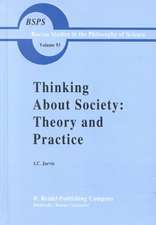The SAGE Handbook of the Philosophy of Social Sciences
Editat de Ian Jarvie, Jesus Zamora-Bonillaen Limba Engleză Hardback – 16 feb 2011
- what are the main fissures and debates in contemporary social scientific thought?
- how are we to make sense of seemingly contrasting approaches to how social scientists find out about the world and justify their claims to have knowledge of it?
In this exciting handbook, Ian Jarvie and Jesús Zamora-Bonilla have put together a wide-ranging and authoritative overview of the main philosophical currents and traditions at work in the social sciences today.
Starting with the history of social scientific thought, this handbook sets out to explore that core fundamentals of social science practice, from issues of ontology and epistemology to issues of practical method. Along the way it investigates such notions as paradigm, empiricism, postmodernism, naturalism, language, agency, power, culture, and causality.
Bringing together in one volume leading authorities in the field from around the world, this book will be a must-have for any serious scholar or student of the social sciences.
Preț: 1128.21 lei
Preț vechi: 1545.51 lei
-27% Nou
Puncte Express: 1692
Preț estimativ în valută:
215.91€ • 234.45$ • 181.36£
215.91€ • 234.45$ • 181.36£
Carte tipărită la comandă
Livrare economică 22 aprilie-06 mai
Preluare comenzi: 021 569.72.76
Specificații
ISBN-13: 9781847874009
ISBN-10: 1847874002
Pagini: 772
Ilustrații: Illustrations
Dimensiuni: 184 x 246 x 47 mm
Greutate: 1.52 kg
Ediția:1
Editura: SAGE Publications
Colecția Sage Publications Ltd
Locul publicării:London, United Kingdom
ISBN-10: 1847874002
Pagini: 772
Ilustrații: Illustrations
Dimensiuni: 184 x 246 x 47 mm
Greutate: 1.52 kg
Ediția:1
Editura: SAGE Publications
Colecția Sage Publications Ltd
Locul publicării:London, United Kingdom
Recenzii
Over four parts (37 chapters), the reader is promised coverage of the development and history of social sciences, as well as paradigms, assessment and use of social theories...Throughout, there are references to key thinkers and theories which provide a helpful refresher on social science history. In addition, the section summaries are clear and the notes and reference sections at the end of each chapter are useful...Not recommended for the casual browser, but a valuable reference book for anyone studying the history or philosophy of social sciences.
Lorraine Simpson
Blake Stevenson Ltd
The Handbook covers an impressively wide range of issues... the Handbook’s many virtues: its aim is ambitious, and it should serve its purpose extremely well.
Lorraine Simpson
Blake Stevenson Ltd
The Handbook covers an impressively wide range of issues... the Handbook’s many virtues: its aim is ambitious, and it should serve its purpose extremely well.
Cuprins
Introduction: Philosophical Problems in the Social Sciences: Paradigms, Methodology and Ontology - Ian C Jarvie
PART ONE: THE DEVELOPMENT OF THE PHILOSOPHY OF SOCIAL SCIENCE
The Philosophy of Social Science from Mandeville to Mannheim - Joseph Agassi
Continental Philosophies of the Social Sciences - David Teira
The Philosophy of Social Science in the 20th Century: Analytic Traditions: Reflections on the <i>Rationalitätstreit - Paul Roth
PART TWO: CENTRAL ISSUES IN SOCIAL ONTOLOGY
Naturalism: The Place of Society in Nature - Don Ross
Language and Society - Frank Hindriks
Social Minds - Laurence Kaufmann
Rational Agency - Fred D'Agostino
Individualism, Collective Agency and the 'Micro-Macro Relation' - Alban Bouvier
Rules, Norms and Commitments - Fabienne Peter and Kai Spiekermann
Systems Theory - Andrea Pickel
The Concept of Culture as Ontological Paradox - Angel Díaz de Rada
Power and Social Class in the 21st Century - Daniel Little
Causality, Causal Models and Social Mechanisms - Daniel Steel
PART THREE: A PHILOSOPHER'S GUIDE TO SOCIAL SCIENCE PARADIGMS
Rational-Choice Theory - Cédric Paternotte
Game Theory - Giacomo Bonanno
Social Networks - Joan de Martí and Yves Zenou
Normative Criteria of Social Choice - Maurice Salles and Antoinette Baujard
Analytical Sociology - Peter Hedström and Petri Ylikoski
Institutions - Chrysostomos Mantzavinos
Evolutionary Approaches - Geoffrey Hodgson
Functionalism and Structuralism - Anthony King
Phenomenology, Hermeneutics and Ethnomethodology - Hans-Herbert Köegler
Pragmatism and Symbolic Interactionism - Alex Dennis
Social Constructionism, Postmodernism and Deconstructionism - Patrick Baert, Darin Weinberg and Véronique Mottier
Theories of Culture, Cognition and Action - Sun-Ki Chai
Communicative Action and Critical Theory - Martin Morris
PART FOUR: METHODOLOGY: ASSESSING AND USING SOCIAL THEORIES
Facts, Values and Objectivity - Heather Douglas
Idealized Representations, Inferential Devices and Cross-Disciplinary Tools: Theoretical Models in Social Sciences - Tarja Knuutila and Jaakko Kuorikoski
Empirical Evidence: Its Nature and Sources - Julian Reiss
Experiments - Francesco Guala
Mathematics and Statistics in the Social Sciences - Stephan Hartmann and Jan Sprenger
Artificial Worlds and Agent-Based Simulation - Till Gr ne-Yanoff
Explanation in the Social Sciences - Jeroen van Bouwel and Erik Weber
Prediction - Gregor Betz
Science and Technology Studies and Social Epistemology: The Struggle for Normativity in Social Theories of Knowledge - Steve Fuller
Expert Judgment - María Jiménez and Jesús Zamora-Bonilla
Social Technology - Maarten Derksen and Anne Beaulieu
EPILOGUE: Rationality in the Social Sciences: Bridging the Gap - Jesús Zamora-Bonilla
PART ONE: THE DEVELOPMENT OF THE PHILOSOPHY OF SOCIAL SCIENCE
The Philosophy of Social Science from Mandeville to Mannheim - Joseph Agassi
Continental Philosophies of the Social Sciences - David Teira
The Philosophy of Social Science in the 20th Century: Analytic Traditions: Reflections on the <i>Rationalitätstreit - Paul Roth
PART TWO: CENTRAL ISSUES IN SOCIAL ONTOLOGY
Naturalism: The Place of Society in Nature - Don Ross
Language and Society - Frank Hindriks
Social Minds - Laurence Kaufmann
Rational Agency - Fred D'Agostino
Individualism, Collective Agency and the 'Micro-Macro Relation' - Alban Bouvier
Rules, Norms and Commitments - Fabienne Peter and Kai Spiekermann
Systems Theory - Andrea Pickel
The Concept of Culture as Ontological Paradox - Angel Díaz de Rada
Power and Social Class in the 21st Century - Daniel Little
Causality, Causal Models and Social Mechanisms - Daniel Steel
PART THREE: A PHILOSOPHER'S GUIDE TO SOCIAL SCIENCE PARADIGMS
Rational-Choice Theory - Cédric Paternotte
Game Theory - Giacomo Bonanno
Social Networks - Joan de Martí and Yves Zenou
Normative Criteria of Social Choice - Maurice Salles and Antoinette Baujard
Analytical Sociology - Peter Hedström and Petri Ylikoski
Institutions - Chrysostomos Mantzavinos
Evolutionary Approaches - Geoffrey Hodgson
Functionalism and Structuralism - Anthony King
Phenomenology, Hermeneutics and Ethnomethodology - Hans-Herbert Köegler
Pragmatism and Symbolic Interactionism - Alex Dennis
Social Constructionism, Postmodernism and Deconstructionism - Patrick Baert, Darin Weinberg and Véronique Mottier
Theories of Culture, Cognition and Action - Sun-Ki Chai
Communicative Action and Critical Theory - Martin Morris
PART FOUR: METHODOLOGY: ASSESSING AND USING SOCIAL THEORIES
Facts, Values and Objectivity - Heather Douglas
Idealized Representations, Inferential Devices and Cross-Disciplinary Tools: Theoretical Models in Social Sciences - Tarja Knuutila and Jaakko Kuorikoski
Empirical Evidence: Its Nature and Sources - Julian Reiss
Experiments - Francesco Guala
Mathematics and Statistics in the Social Sciences - Stephan Hartmann and Jan Sprenger
Artificial Worlds and Agent-Based Simulation - Till Gr ne-Yanoff
Explanation in the Social Sciences - Jeroen van Bouwel and Erik Weber
Prediction - Gregor Betz
Science and Technology Studies and Social Epistemology: The Struggle for Normativity in Social Theories of Knowledge - Steve Fuller
Expert Judgment - María Jiménez and Jesús Zamora-Bonilla
Social Technology - Maarten Derksen and Anne Beaulieu
EPILOGUE: Rationality in the Social Sciences: Bridging the Gap - Jesús Zamora-Bonilla
Descriere
A comprehensive overview of the fundamental philosophical and methodological problems characteristic of the social sciences, as well as the main approaches and schools of thought within the discipline.

















